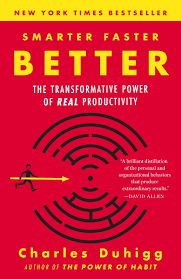Smarter, Faster, Better: Enhancing Productivity and Innovation at IAS-Research.com Through Strategic Partnerships and Data-Driven Optimization
Executive Summary:
In the rapidly evolving landscape of research and development, IAS-Research.com must prioritize efficiency and innovation to maintain a competitive edge. This white paper leverages the principles outlined in Charles Duhigg's "Smarter Faster Better" to provide a framework for optimizing research operations. By strategically implementing strategies for motivation, goal-setting, focus, decision-making, team management, innovation, data assimilation, and leadership, coupled with strategic partnerships like that with keencomputer.com, IAS-Research.com can achieve significant advancements in research output and operational efficiency.
1. Introduction:
IAS-Research.com operates within a domain demanding rigorous inquiry and pioneering breakthroughs. To maximize the impact of its research endeavors, a systematic approach to productivity enhancement is crucial. This white paper explores the application of Duhigg's "Smarter Faster Better" principles, augmented by strategic collaborations, to optimize research operations at IAS-Research.com.
2. Core Principles from "Smarter Faster Better":
Duhigg's framework identifies eight key principles for superior productivity:
- Motivation: Fostering intrinsic drive through purpose and autonomy.
- Goal Setting: Structuring objectives for long-term strategic success.
- Focus: Cultivating cognitive discipline to minimize distractions.
- Decision Making: Implementing structured frameworks for informed choices.
- Managing Teams: Building collaborative and efficient teams.
- Innovation: Encouraging experimentation and creative problem-solving.
- Absorbing Data: Extracting insights from experiences and data.
- Managing Others: Implementing effective leadership strategies.
3. Application of Principles to IAS-Research.com:
3.1. Motivation as a Learned Skill:
- Foster a culture of autonomy and ownership.
- Use Case: Implement a "Project Incubator" program, allowing researchers to propose and lead projects aligned with their interests.
- Develop internal seminars on the science of motivation.
- Implement peer recognition and reward systems.
3.2. Effective Goal Setting with SMART and OKRs:
- Utilize both SMART and OKR frameworks.
- Use Case: Implement quarterly OKR reviews to track progress.
- Incorporate milestone-based project management tools.
- Promote regular goal-setting workshops.
3.3. Enhancing Focus and Decision Making:
- Minimize distractions with "focus blocks" and quiet workspaces.
- Use Case: Utilize AI-powered tools for data analysis and decision support.
- Potential Collaboration with keencomputer.com: Explore partnerships to develop customized AI-driven solutions for data analysis, information filtering, and decision support. Their expertise in custom software development and AI integration can provide IAS-Research.com with tailored tools.
- Develop standardized decision-making frameworks.
- Utilize data visualization platforms.
3.4. Managing Teams for Optimal Performance:
- Foster interdisciplinary collaboration.
- Use Case: Implement AI-driven collaboration platforms.
- Develop team-building activities.
- Conduct regular team performance reviews.
3.5. Driving Innovation Through Experimentation:
- Create a "research sandbox" environment.
- Use Case: Allocate resources for exploratory research.
- Potential Collaboration with keencomputer.com: Investigate joint R&D projects, leveraging keencomputer.com's expertise in advanced computing, AI, and data analytics. Their specialized knowledge can accelerate the development of innovative solutions and facilitate the implementation of cutting-edge technologies within IAS-Research.com's research initiatives. keencomputer.com could also produce custom software to manage the sandbox environment, and the data that it produces.
- Organize innovation showcases.
- Implement a system for capturing lessons learned.
3.6. Absorbing Data for Continuous Learning:
- Leverage machine learning and data analytics.
- Use Case: Develop predictive models for research trends.
- Implement a knowledge management system.
- Conduct data analysis workshops.
3.7. Managing Others for Leadership Efficiency:
- Implement mentorship programs.
- Use Case: Provide leadership training for senior researchers.
- Establish clear communication channels.
- Promote a culture of servant leadership.
4. The Science of Productivity and Strategic Partnerships:
- Incorporate insights from neuroscience, psychology, and behavioral economics.
- Potential Collaboration with keencomputer.com: Explore the application of advanced computing and AI to analyze and model human behavior, leveraging keencomputer.com's technical expertise to enhance our understanding of productivity and innovation. This could lead to the development of personalized productivity tools and strategies for IAS-Research.com's researchers.
- Leverage research on cognitive load and attention management.
- Apply behavioral economics principles to incentive structures.
- Utilize neuroscience research for effective training.
5. References:
- Duhigg, C. (2016). Smarter Faster Better: The Transformative Power of Real Productivity. Random House.
- Samuel Thomas Davies. "Book Summary: Smarter Faster Better" -
- Wharton School of Business. "The New Science of Productivity" -
- PeopleThriver. "Employee Motivation and its Impact on Productivity" -
- Wrike Blog. "Scientific Management to Improve Workflows" -
- Frontiers in Psychology. "Improving Decision-Making Through Cognitive Strategies" -
- OKR Resources. Websites and books from John Doerr and other OKR experts.
- Neuroscience of Focus. Research from sources like the MIT neuroscience department.
- keencomputer.com official website and related documentation.
6. Conclusion:
By strategically implementing "Smarter Faster Better" principles and fostering strategic partnerships with entities like keencomputer.com, IAS-Research.com can cultivate a culture of high performance, innovation, and continuous improvement. A data-driven approach to motivation, goal-setting, focus, decision-making, team management, innovation, and leadership will ensure IAS-Research.com remains at the forefront of research excellence. By embracing these principles, and leveraging the specialized skills of partners, IAS-Research.com will not only enhance its productivity but also empower its researchers to achieve their full potential and drive groundbreaking discoveries.



